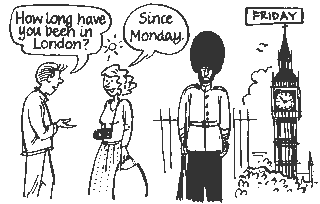[Infinitives/Gerunds]
Adapted from English Grammar Online 4U.
There are certain words in English that are usually followed by an infinitive or gerund. If you are not sure whether to use the infinitive or gerund, check out our lists or look the words up in a dictionary.
Infinitives or Gerunds?
Certain words are followed by either an infinitive or gerund form, but the meaning of the word often changes accordingly.- Same meaning.
- After these verbs: attempt, begin, bother, cannot bear, cease, continue, hate, intend, love, prefer, start.
- I started to read. / I started reading.
- Special cases: advise, allow/permit, forbid.
- Infinitive + object: She allowed him to take the car.
- Gerund, no object: She allowed taking the car.
Verb Infinitive meaning Gerund meaning
| forget / remember | with regard to the future Remember to switch off the lights. | with regard to the past Do you remember switching off the lights? |
| go on | start something new Go on to read. | continue with the same action Go on reading. |
| regret | with regard to the future I regret to say that. | with regard to the past I regret saying that. |
| stop | interrupt another action I stopped to smoke. | terminate, give up I stopped smoking. |
| try | do something complicated Try to solve this riddle. | do it and see what happens Try talking to him. |
- Infinitive (without to) or gerund.
- Special cases: feel, hear see.
- Infinitive meaning: to emphasize that the action is completed. I saw him go up the stairs.
- Gerund meaning: the action may or may not be completed. I saw him going up the stairs. I saw him as he was doing this.
- Special cases: go, come.
- Infinitive meaning: to express a purpose. She is coming to show us the pictures.
- Gerund meaning: in connection with activities. Let's go shopping, dancing ....










